キーワード:ヘルスプロモーション、ケア、地域、学校、職域
http://www.hcs.tsukuba.ac.jp/~takeda/phpr.html
 少子高齢化による社会構造変化にともない、我が国では子ども、 妊娠育児期の女性、労働者、障害者、高齢者などにおける心身の健康問題が増大し、ケアを必要とする人々が増えています。これらの健康問題はいずれも、生物 学的要因のみならずストレスや社会経済環境といった心理社会的要因の影響を受けるため、医療による治療や予防に加えて、人々の認知・行動や政策・サポートシステムを改善する心理社会的アプローチが必要です。このリサーチユニットでは、健康社会学・健康体力学・公衆衛生学・精神保健学・社会福祉学・口腔保健学など、保健医療福祉を包括する学際領域の協同により、子どもから高齢者までさまざまな立場の人の心身の健康問題とそのケアに関わる心理社会的要因について実証解明し、地域・学校・職域でのヘルスプロモーション施策を検討しています(図1)。
少子高齢化による社会構造変化にともない、我が国では子ども、 妊娠育児期の女性、労働者、障害者、高齢者などにおける心身の健康問題が増大し、ケアを必要とする人々が増えています。これらの健康問題はいずれも、生物 学的要因のみならずストレスや社会経済環境といった心理社会的要因の影響を受けるため、医療による治療や予防に加えて、人々の認知・行動や政策・サポートシステムを改善する心理社会的アプローチが必要です。このリサーチユニットでは、健康社会学・健康体力学・公衆衛生学・精神保健学・社会福祉学・口腔保健学など、保健医療福祉を包括する学際領域の協同により、子どもから高齢者までさまざまな立場の人の心身の健康問題とそのケアに関わる心理社会的要因について実証解明し、地域・学校・職域でのヘルスプロモーション施策を検討しています(図1)。
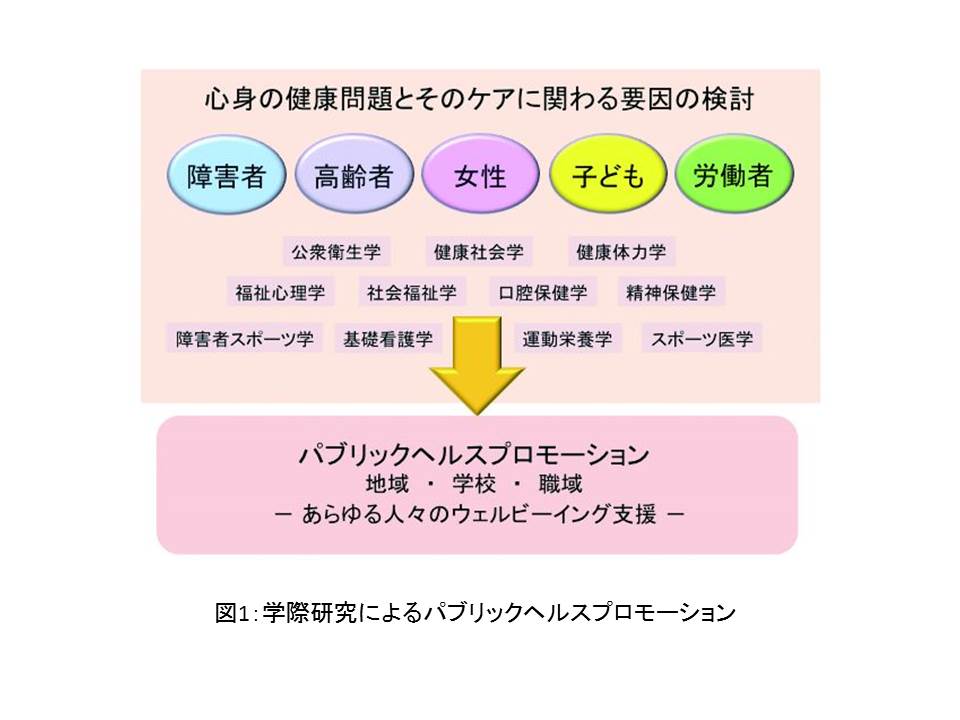
健康を支援するアプローチ
健康を支援するアプローチには、複眼的視点が重要です。たとえば個人要因 ⇔ 環境要因、ヘルスセクター(保健関連組織)の支援 ⇔ ノンヘルスセクター(保健に関連しない組織)の支援、疾病生成要因(病気のリスクファクターなど) ⇔ 健康生成要因(ストレス対処力など)、ネガティブ指標(病気や障害) ⇔ ポジティブ指標(満足感や幸福感)などです。それぞれの視点からの研究を融合して効果的アプローチを検討し、個人さらに組織の健康・パフォーマンスの向上をめざします(図2)。
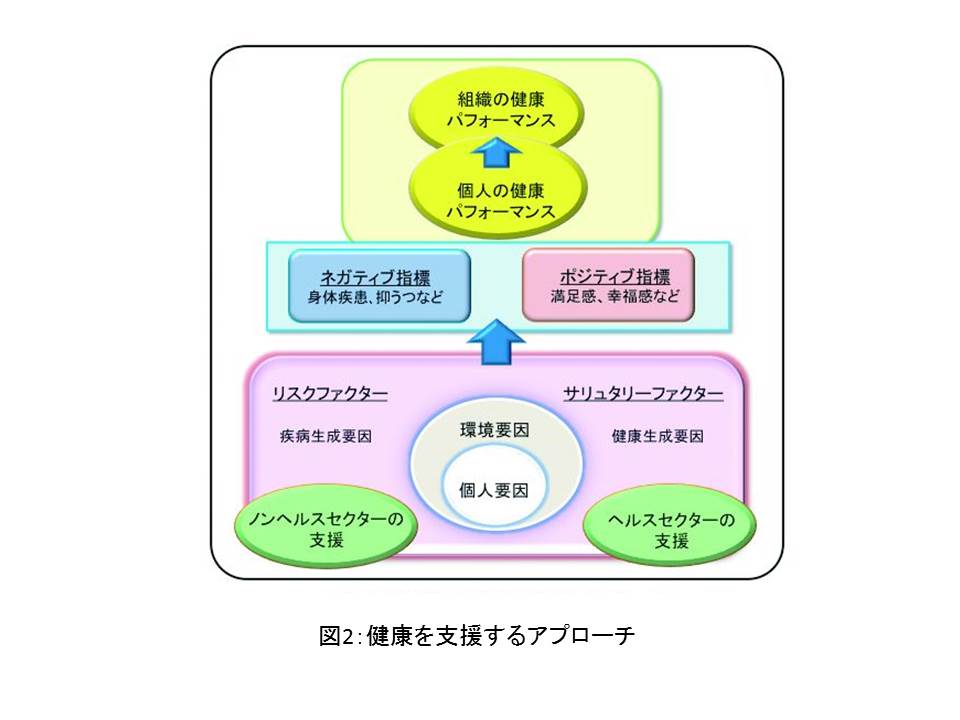
ケアする人達のストレスにも注目
高齢者や障害者の生活の質(QOL)維持のための適切なサービスを提供するケアワーカー不足が深刻化しています。一方でケアワーカーのストレスや健康問題 が指摘されており、人材確保の上ではまず健康な労働生活の保障が不可欠です。これまで、ケアワーカーの健康に関する研究は高齢者介護施設で多く行われていますが、障害者支援施設では十分行われていません。そこで私たちは障害者ケアワーカーのメンタルヘルスと心理社会的要因について実証検討し、ケアする人・される人、両者のヘルスプロモーションをすすめています(図3)。
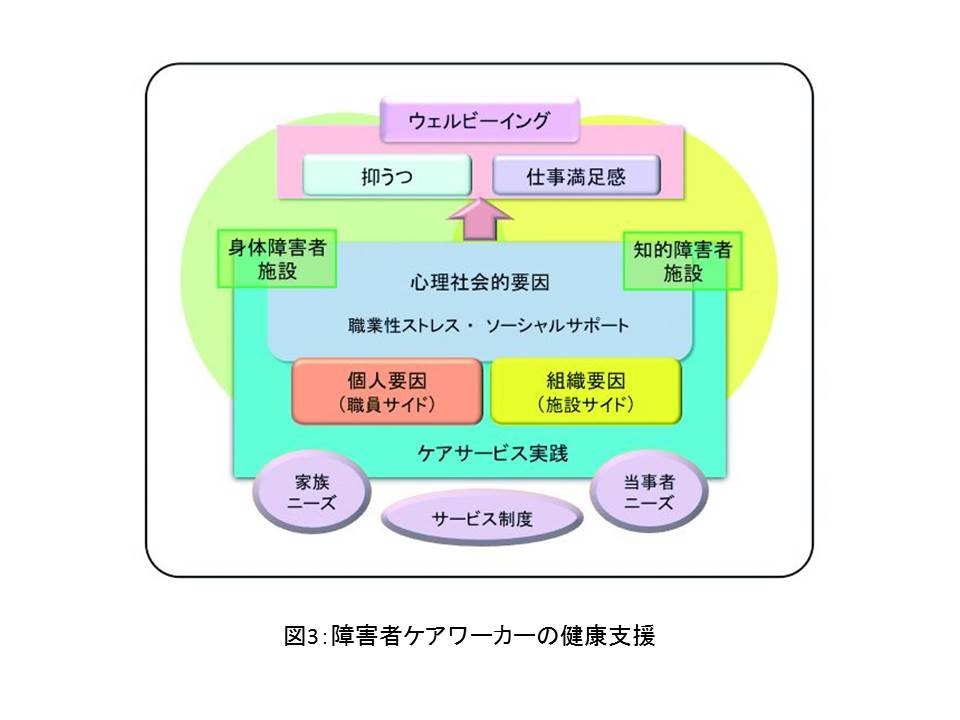
社会への貢献・実績
● 講演「健康職場を推進するための要因とフレームワーク」、株式会社クオレ・シー・キューブ。労働者のメンタルヘルスに関する研究成果を企業現場へ発信。 ● 筑波大学重点公開講座「子どもの健康生活スキルアップ」、筑波大学東京キャンパス文京校舎。子どものむし歯と偏食の予防に関する研究成果を、地域・学校で健康教育を実践する歯科衛生士や保健師、養護教諭などに還元(写真1)。
(取材:平成25年7月10日)
Toward the Realization of a Society which Ensures Well-being for All People : Public health promotion
Unit members : Kondo, Masahide Sakairi, Yosuke Ichikawa, Masao Mizuno Tomomi Maeda, Seiji Omi, Naomi
Key words:health promotion, care, community, school, workplace
 Along with changes in the social structure caused by an aging population and a declining birthrate, increasing numbers of people, including children, pregnant women/child-raising mothers, workers, people with disabilities, and elderly people, are suffering from health-related problems and requiring care in Japan. These problems are caused by not only biological factors, but also psychosocial factors, such as stress and the socioeconomic environment; therefore, in addition to medical treatment and preventive medicine, psychosocial approaches are necessary to improve people’s awareness and behavior as well as governmental policies and support systems. Our research unit aims to verify psychosocial factors related to physical and mental health problems for all people and their care, and examine measures to promote health in communities, schools, and at workplaces, through cooperation across the interdisciplinary field of healthcare studies, such as the sociology of health, health and exercise science, public health, mental health, social welfare, and oral health (Figure 1).
Along with changes in the social structure caused by an aging population and a declining birthrate, increasing numbers of people, including children, pregnant women/child-raising mothers, workers, people with disabilities, and elderly people, are suffering from health-related problems and requiring care in Japan. These problems are caused by not only biological factors, but also psychosocial factors, such as stress and the socioeconomic environment; therefore, in addition to medical treatment and preventive medicine, psychosocial approaches are necessary to improve people’s awareness and behavior as well as governmental policies and support systems. Our research unit aims to verify psychosocial factors related to physical and mental health problems for all people and their care, and examine measures to promote health in communities, schools, and at workplaces, through cooperation across the interdisciplinary field of healthcare studies, such as the sociology of health, health and exercise science, public health, mental health, social welfare, and oral health (Figure 1).
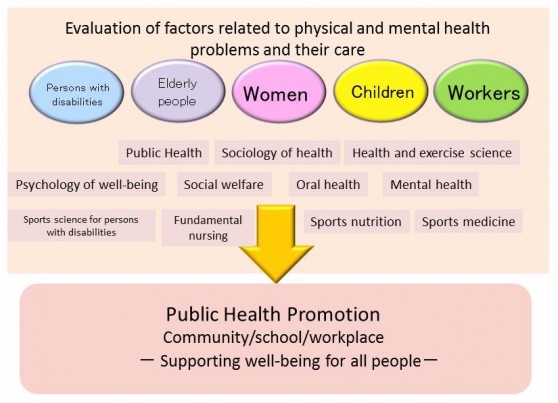
Figure 1 : Public health promotion through interdisciplinary research
Approaches to supporting health
Multiple perspectives are essential to support people’s health, such as individual factors environmental factors, support from health sectors (healthcare-related organizations) support from non-health sectors (organizations not related to healthcare), disease-causing factors (disease risk factors) health-promoting factors (stress-coping), and negative indices (diseases and disabilities) positive indices (a sense of satisfaction and well-being). Our unit aims to examine effective approaches by integrating research from different perspectives, and improve the health and performance of individuals and organizations (Figure 2).
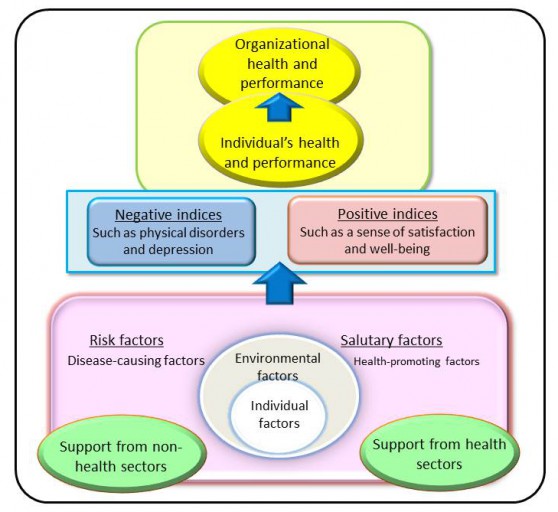
Figure 2 : Approaches to supporting health
Focusing on caregivers’ stress
Japan faces a growing shortage of care workers who provide appropriate support for elderly people and people with disabilities to maintain their quality of life. On the other hand, stress and health problems in care workers have been highlighted, and so ensuring healthy working lives is essential to secure human resources. Although many studies have investigated the health status of care workers working in elderly nursing homes, few studies have investigated those working in care facilities for persons with disabilities. Our unit empirically examines the mental health of and psychosocial factors among care workers who support people with disabilities, and strives to promote a healthy lifestyle for both care workers and receivers (Figure 3).
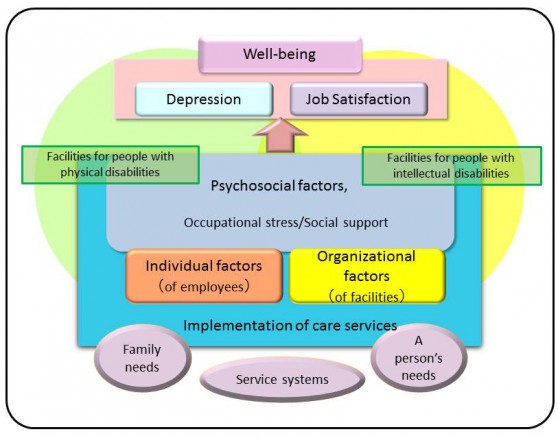
Figure 3 : Healthcare support for care workers who provide care for people with disabilities
Social contributions and achievements
● Lecture on “Factors and framework to promote a healthy workplace” conducted at Cuore C Cube. We disseminated our research findings on workers’ mental health in business settings.
● An open lecture on “Tips to brush up skills to achieve healthy living for children” conducted at Bunkyo School, Tokyo Campus of the University of Tsukuba. We reported study results regarding dental caries in children and the prevention of picky eating behaviors to dental hygienists, public health nurses, and nursing teachers who implement health education in communities and schools.
